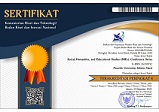Differentiated Learning with the Problem Based Learning Model in Elementary School Science Learning: Literature Review
Abstract
This research aims to present a comprehensive understanding of differentiated learning strategies using the problem based learning (PBL) model through a synthesis of relevant literature. The literature review method was carried out by investigating scientific articles, books, and publications related to the application of differentiated learning using the PBL model in the context of basic education. A critical analysis of the literature was carried out to evaluate the implementation, impact, and obstacles that arise in implementing these learning strategies. This article seeks to provide an in-depth view of the principles and practices of implementing differentiated learning with PBL at the elementary school level. The research results show that the application of differentiated learning using the problem based learning (PBL) model is carried out through four components, namely differentiation of content, process, product, and learning environment. This learning also has a positive impact on the science competency of elementary school students, such as improving learning outcomes. The obstacles encountered by teachers in implementation are difficulties in compiling and carrying out diagnostic assessments, compiling appropriate content, implementing differentiated learning using the PBL learning model according to grouping, and giving assignments that must suit the learning style of each student. The implications of this literature can guide educators in designing and implementing innovative learning strategies that suit students' needs.
Keywords
Full Text:
PDFRefbacks
- There are currently no refbacks.





